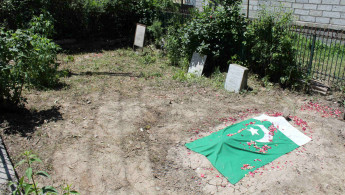Professor-turned-militant gunned down in Kashmir
Five militants and six civilians were killed in a gunfight in the southern Shopian district of Indian-administered Kashmir on May 6. A senior commander and a university professor who had joined the militant ranks only two days previously were among the dead.
The killings were followed by a general strike and widespread street protests across the region. Anticipating student protests, local government ordered schools and colleges to be shut down. Mobile internet also remains offline.
While the police, in an official statement, said that militants fired upon Indian troopers and were killed in retaliation, pro-independence leadership called the gunfight "a bloodbath".
Since the start of this year, 60 civilians and armed rebels have been killed in Kashmir, mostly in the southern districts of Shopian, Pulwama and Kulgam.
The professor
An uneasy calm has descended upon the prosperous village of Chundina, tucked away deep amid the paddy fields of central Kashmir's Ganderbal district. One of the village's most promising young men now lies buried in a graveyard designated for "martyrs" - those killed by Indian police and army troops.
Mohammad Rafi, an assistant professor of sociology at the University of Kashmir, had been a member of the Hizbul Mujahideen - one of Kashmir's largest militant groups, deemed a "terrorist organisation" by India, the US and the European Union - for no more than 36 hours, when he, along with four of his associates, were hunted down and killed by Indian forces in Shopian.
A versatile scholar, Rafi's Facebook profile - since removed - contains quotes from Howard Zinn, Muhammed Iqbal and Nietzsche.
His friends remember him as a pious and polite soul, who proactively engaged in philanthropic activities. "He never tolerated oppression against anyone and often expressed unease regarding the abuses that Indian forces perpetrate in Kashmir," Muzaffer Ahmed, his cousin, told The New Arab.
Why would Rafi join the rebel ranks? His friends are perplexed. "You cannot persuade or dissuade such a highly educated individual," said one of his friends. "It must have been a fully conscious decision."
On the Friday morning, Rafi told his young wife not to panic if she couldn't reach him by phone. Then, as usual, he shook his father's hand and left to deliver his lectures at the university. When Rafi didn't return home, his worried family filed a missing persons report with the police.
Next day, the university erupted in protests, with many suspecting that he had been arbitrarily detained by Indian troops.
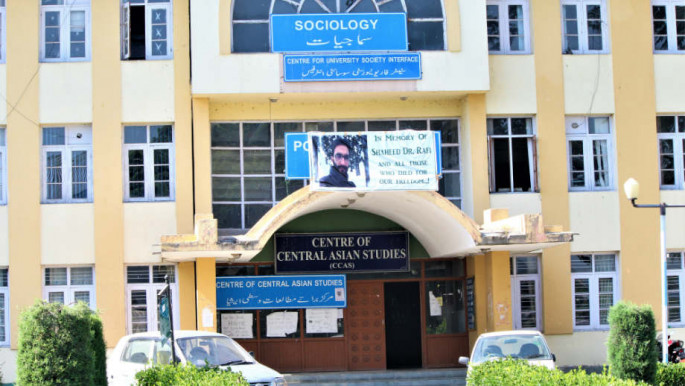 |
| Rafi's academic colleagues had been grooming him to take over the Sociology department [Saqib Mir] |
"We had absolutely no idea that Rafi had joined the rebels until his phone call on the day of the gunfight," Abdul Raheem Bhat, his father, told The New Arab. "During the call, he bid us a final adieu and requested that his mother not cry, as he was now going to be a martyr."
His family denied officials' claims that state authorities had brought them to the gunfight to persuade Rafi to surrender.
The University of Kashmir's department of sociology, where Rafi taught, is mourning the death of one of their brightest academics. His students and colleagues described him as resourceful and dedicated. "Besides helping us academically, Professor Rafi used to provide monetary help to some of the students," said Jahangir Abdullah, one of his students.
The day before he went missing, Rafi had prepared test papers for one of the courses that he taught. The papers still lie sealed in an envelope. "All this is nothing short of unbelievable," said Pirzada M Amin, head of the sociology department. "We were grooming him to be the future of this department."
The commander
In Heff village, Shopian district, some 70 kilometres south of Ganderbal, Bilal Ahmad's family receives mourners in a large makeshift tent erected in the courtyard of their home.
Pro-independence songs blare from loudspeakers across the village. Ahmad had joined the militant ranks two years ago after being repeatedly detained and reportedly tortured by Indian troops.
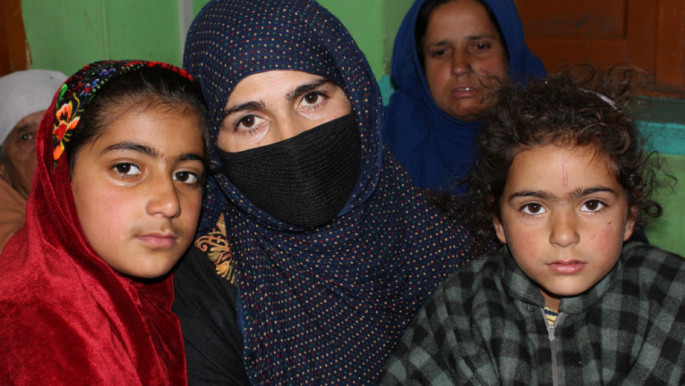 |
| Wife Shaheena Akhter and the rest of Ahmad's family remain in mourning [Saqib Mir] |
"The forces harassed him constantly," said Shaheena Akhter, Bilal's wife. "Otherwise, why would a father of two children pick up arms?"
Akhter has been suffering from a skull infection from the past four months and needs specialized treatment. "They even desecrated his body," she added.
A few metres up the hill is the house of Saddam Padder, a top-ranking rebel commander until his death during the same gunfight. One of the longest surviving members of Kashmir's new-age militancy, local police officials described the 24-year-old as a master recruiter and called his killing a major success.
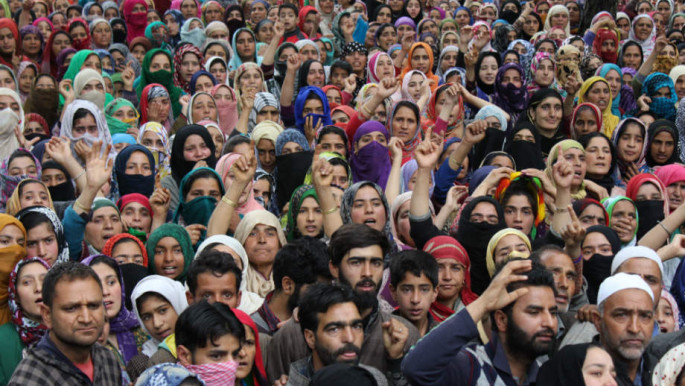 |
| Bilal Ahmed and Saddam Padder's joint funeral drew thousands of mourners [Saqib Mir] |
While Saddam was active within militant ranks, Indian forces personnel ransacked his family home and tortured his father, Ghulam Mohiuddin, several times.
"It is the oppression which Indians have unleashed in Kashmir that forced my son to join the rebels," Mohiuddin told The New Arab while the shrieks of female mourners filled the room. "Saddam's jaw and teeth were broken after they killed him," he added.
Six civilians were also killed during or in the aftermath of the gun battle in Shopian - three of them from the neighbouring district of Pulwama.
Ghulam Mohammad Kumar, a farmer from Pulwama's Arihal village, is devastated by the death of his youngest son. The 16-year-old Nisar Ahmad was shot dead near the gunfight.
"Some of the Indian forces personnel were wounded during the operation. That is why they killed civilians in retribution," one of Nisar's relatives claimed.
As soon as the news of gunfight spread early in the morning, 19-year-old Asif Ahmad Mir, a college student from Ruhmoo village, performed Wudu (the Islamic ablution ritual carried out before prayer) and left on his motorcycle.
Mir, along with other civilians, apparently tried to march to the gun fight and disrupt the Indian army's operation. He was shot in the head.
"We tried to take him to the hospital on the motorcycle but he couldn't make it," one of his friends said. Mir was the founding member of a local volunteer organisation that responds to critical situations such as medical emergencies and natural disasters.
His father, Ghulam Mohammad Mir, was also tortured by India in the 1990s. "If I had known Asif was going to be a martyr, I would have given him the respect that a person of his stature deserves," said Mir Senior in a defiant tone.
In the nearby Ayangund village, elderly women touch the banners that hang outside Zubair Ahmad Nengroo's house and wipe their faces with reverence. The 15-year-old schoolboy was shot multiple times at least a mile away from the gunfight. The bullets tore through Zubair's heart and shoulder.
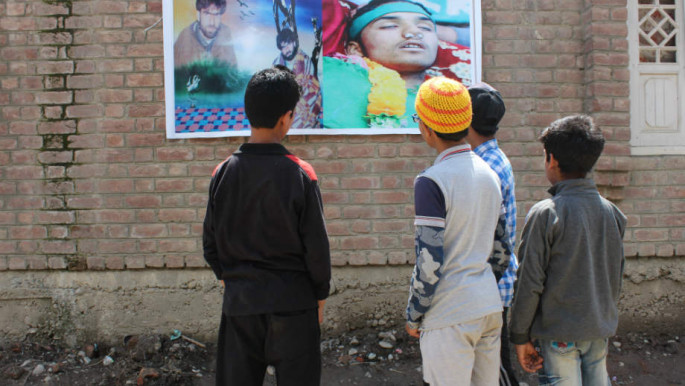 |
| Zubair's friends gather outside his family home [Saqib Mir] |
His family said that while Zubair lay bleeding, an ambulance was prevented from reaching him by Indian personnel. "He could have been saved if they had let the ambulance pass," claimed one of Zubair's friends.
Zubair and his friends had left home with the intention of joining the funeral prayers of slain militants. "Besides going to school, my son took care of his diabetic and partially blind mother," his father, Mohammad Rajab Nengroo, told The New Arab. "While leaving, Zubair promised us that he would tend to the kitchen garden on his return."
